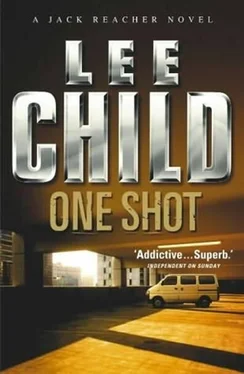Lee Child - One Shot
Здесь есть возможность читать онлайн «Lee Child - One Shot» весь текст электронной книги совершенно бесплатно (целиком полную версию без сокращений). В некоторых случаях можно слушать аудио, скачать через торрент в формате fb2 и присутствует краткое содержание. Жанр: Триллер, на английском языке. Описание произведения, (предисловие) а так же отзывы посетителей доступны на портале библиотеки ЛибКат.
- Название:One Shot
- Автор:
- Жанр:
- Год:неизвестен
- ISBN:нет данных
- Рейтинг книги:4 / 5. Голосов: 1
-
Избранное:Добавить в избранное
- Отзывы:
-
Ваша оценка:
- 80
- 1
- 2
- 3
- 4
- 5
One Shot: краткое содержание, описание и аннотация
Предлагаем к чтению аннотацию, описание, краткое содержание или предисловие (зависит от того, что написал сам автор книги «One Shot»). Если вы не нашли необходимую информацию о книге — напишите в комментариях, мы постараемся отыскать её.
One Shot — читать онлайн бесплатно полную книгу (весь текст) целиком
Ниже представлен текст книги, разбитый по страницам. Система сохранения места последней прочитанной страницы, позволяет с удобством читать онлайн бесплатно книгу «One Shot», без необходимости каждый раз заново искать на чём Вы остановились. Поставьте закладку, и сможете в любой момент перейти на страницу, на которой закончили чтение.
Интервал:
Закладка:
“May I have your name?”
“Jack Reacher.”
The receptionist dialed a phone and spoke. Reacher guessed she was speaking to a secretary, because both he and Rodin were referred to in the third person, like abstractions. Can he see a Mr. Reacher about the case ? Not the Barr case. Just the case. The conversation continued. Then the receptionist covered the phone by clamping it to her chest, below her collarbone, above her left breast.
“Do you have information?” she asked.
The secretary upstairs can hear your heart beating , Reacher thought.
“Yes,” he said. “Information.”
“From the army?” she asked.
Reacher nodded. The receptionist put the phone back to her face and continued the conversation. It was a long one. Mr. A. A. Rodin had an efficient pair of gatekeepers. That was clear. No way of getting past them without some kind of an urgent and legitimate reason. That was clear, too. Reacher checked his watch. Nine-forty in the morning. But there was no rush, under the circumstances. Barr was in a coma. Tomorrow would do it. Or the next day. Or maybe he could get to Rodin through the cop, if need be. What was his name? Emerson?
The receptionist hung up the phone.
“Please go straight up,” she said. “Mr. Rodin is on the third floor.”
I’m honored , Reacher thought. The receptionist wrote his name on a visitor pass and slipped it into a plastic sleeve. He clipped it on his shirt and headed for the elevator. Rode it to the third floor. The third floor had low ceilings and internal corridors lit by fluorescent tubes. There were three doors made of painted fiberboard that were closed and one set of double doors made of polished wood that were open. Behind those was a secretary at a desk. The second gatekeeper. She was younger than the downstairs lady but presumably more senior.
“Mr. Reacher?” she asked.
He nodded and she came out from behind her desk and led him to where the windowed offices started. The third door they came to was labeled A. A. Rodin .
“What’s the A. A . for?” Reacher asked.
“I’m sure Mr. Rodin will tell you if he wants to,” the secretary said.
She knocked on the door and Reacher heard a baritone reply from inside. Then she opened the door and stood aside for Reacher to go in past her.
“Thanks,” he said.
“You’re most welcome,” she said.
Reacher went in. Rodin was already on his feet behind his desk, ready to welcome his visitor, full of reflexive courtesy. Reacher recognized him from the TV. He was a guy of about fifty, fairly lean, fairly fit, gray hair cut short. In person he looked smaller. He was maybe an inch under six feet and a pound under two hundred. He was dressed in a summer-weight suit, dark blue. He had a blue shirt on, and a blue tie. His eyes were blue. Blue was his color, no doubt about it. He was immaculately shaved and wearing cologne. He was a very squared-away guy, no question. As opposed to me , Reacher thought. It was like a study in contrasts. Next to Rodin, Reacher was an unkempt giant. He was six inches taller and fifty pounds heavier. His hair was two inches longer and his clothes were a thousand dollars cheaper.
“Mr. Reacher?” Rodin said.
Reacher nodded. The office was government-basic, but neat. It was cool and quiet. No real view from the window. Just the flat roofs of the off-brand stores and the DMV office, with all the ductwork showing. The black glass tower was visible in the distance. There was a weak sun in the sky. At a right angle to the window there was a trophy wall behind the desk, with college degree certificates and photographs of Rodin with politicians. There were framed newspaper headlines reporting guilty verdicts in seven different cases. On another wall was a photograph of a blonde girl wearing a mortarboard and a gown and holding a degree scroll. She was pretty. Reacher looked at her for a moment longer than he needed to.
“That’s my daughter,” Rodin said. “She’s a lawyer, too.”
“Is she?” Reacher said.
“She just opened her own office here in town.”
There was nothing in his tone. Reacher wasn’t sure whether he was proud, or disapproving.
“You’re due to meet with her, I think,” Rodin said.
“Am I?” Reacher said. “Why?”
“She’s defending James Barr.”
“Your daughter? Is that ethical?”
“There’s no law against it. It might not be sensible, but it’s not unethical.”
He said sensible with emphasis, hinting at a number of meanings. Not smart to defend a notorious case, not smart for a daughter to take on her father, not smart for anyone to take on A. A. Rodin. He sounded like a very competitive guy.
“She put your name on her provisional witness list,” he said.
“Why?”
“She thinks you have information.”
“Where did she get my name?”
“I don’t know.”
“From the Pentagon?”
Rodin shrugged. “I’m not sure. But she got it from somewhere. Therefore people have been looking for you.”
“Is that why I got in here?”
Rodin nodded.
“Yes, it is,” he said. “That’s exactly why. Generally I don’t encourage walk-ins.”
“Your staff seems to be on board with that policy.”
“I certainly hope so,” Rodin said. “Sit down, please.”
Reacher sat in the visitor chair and Rodin sat behind his desk. The window was on Reacher’s left and Rodin’s right. Neither man had the light in his eyes. It was an equitable furniture arrangement. Different from some prosecutors’ offices Reacher had known.
“Coffee?” Rodin asked.
“Please,” Reacher said.
Rodin made a call and asked for coffee.
“Naturally I’m interested in why you came to see me first,” he said. “The prosecution, I mean, rather than the defense.”
“I wanted your personal opinion,” Reacher said.
“On what?”
“On how strong a case you’ve got against James Barr.”
Rodin didn’t answer immediately. There was a short silence and then there was a knock at the door and the secretary came in with coffee. She had a silver tray with the works on it. A French press, two cups, two saucers, a sugar bowl, a tiny pitcher of cream, two silver spoons. The cups were fine china. Not government issue , Reacher thought. Rodin likes his coffee done right . The secretary put the tray on the edge of the desk, so that it was exactly halfway between the desk chair and the visitor chair.
“Thanks,” Reacher said.
“You’re most welcome,” she said, and left the room.
“Help yourself,” Rodin said. “Please.”
Reacher pushed the plunger down and poured himself a cup, no cream, no sugar. It smelled dark and strong. Coffee, done right.
“The case against James Barr is exceptionally good,” Rodin said.
“Eyewitnesses?” Reacher asked.
“No,” Rodin said. “But eyewitness testimony can be of random value. I’m almost glad we don’t have eyewitnesses. Because what we’ve got instead is exceptional physical evidence. And science doesn’t lie. It doesn’t get confused.”
“Exceptional?” Reacher said.
“A complete rock-solid evidence trail that ties the man to the crime.”
“How solid?”
“As good as it gets. The best I’ve ever seen. I’m completely confident.”
“I’ve heard prosecutors say that before.”
“Not this one, Mr. Reacher. I’m a very cautious man. I don’t prosecute capital cases unless I’m certain of the outcome.”
“Keeping score?”
Rodin gestured above and behind him at his trophy wall.
“Seven for seven,” he said. “One hundred percent.”
“In how long?”
“In three years. James Barr will make it eight for eight. If he ever wakes up.”
Читать дальшеИнтервал:
Закладка:
Похожие книги на «One Shot»
Представляем Вашему вниманию похожие книги на «One Shot» списком для выбора. Мы отобрали схожую по названию и смыслу литературу в надежде предоставить читателям больше вариантов отыскать новые, интересные, ещё непрочитанные произведения.
Обсуждение, отзывы о книге «One Shot» и просто собственные мнения читателей. Оставьте ваши комментарии, напишите, что Вы думаете о произведении, его смысле или главных героях. Укажите что конкретно понравилось, а что нет, и почему Вы так считаете.












